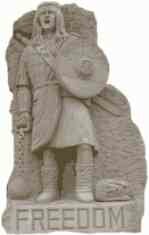|
FAMOUS SCOTS: William Wallace
 Mel Gibson took a remarkable chance when he decided to direct and star in a film about William Wallace. No other name in Scottish history evokes the deep-rooted feelings of patriotism and defiance of ill-placed authority than that of Wallace. Mel Gibson took a remarkable chance when he decided to direct and star in a film about William Wallace. No other name in Scottish history evokes the deep-rooted feelings of patriotism and defiance of ill-placed authority than that of Wallace.
There is no doubt that Mr Gibson tinkered around a bit with the facts to ensure that his film Braveheart finished on time and to the right critical acclaim. Ironically, and in fairness to the film, most of the people who have viewed it have developed a better understanding of that bloody period of Scottish history and what exactly the likes of Wallace and his fellow freedom fighter, Robert the Bruce, were all about.
William Wallace turned out to be one of the greatest patriots in the history of Scotland. In his earlier days however some of his exploits were not so noteworthy. After a number of escapades, including one which saw him murder the son of the governor of Dundee, he was proclaimed a traitor, outlawed and was obliged to hide in the surrounding hills and glens.
After the heavy Scottish defeat at the hands of the English at Dunbar in 1296 many Scots looked to Wallace to take up the cause of Scottish independence. In a series of raids and attacks he made life extremely difficult for the occupying English noblemen. This included putting to the sword the English sheriff of Lanark who is reported to have been responsible for the death of Wallace's sweetheart, the heiress of Lamington.
Wallace's escapades soon started to attract the support of other like minded Scots noblemen, including Robert the Bruce, and they combined forces to make life even more difficult for the occupying English forces. It was only a matter of time before their activities came to the notice o the "Hammer of the Scots" Edward I
He sent a force of 40,000 soldiers and 300 horsemen to bring Wallace and his followers to heal. This he succeeded in doing when the two armies came face to face near Irvine in July 1297.
Having been deserted by some disillusioned Scottish lords, Wallace was obliged to avoid doing battle and with his men retreated north. It was not long however before he got his revenge. At the battle of Stirling Bridge Wallace's outnumbered and ill-equipped army soundly defeated the English. The battle lasted only one hour.
Furious at this defeat Edward himself took control and on the 3rd of July, 1298 brought an army of 12,500 foot soldiers and 2,000 horse and at Falkirk on July 22nd the two armies met. In the first major move of the battle Edward called for his archers and soon the sky was black with iron tipped arrows. This was quickly followed by a charge of the English horse. The Scottish defenses were breached and Wallace was obliged to leave the field. His army was duly slaughtered with the English claiming that they lost more horses than men. Wallace continued to be a hero amongst his own people but was betrayed and taken to London where he was found guilty of treason and executed in the most horrendous and barbaric way.
This did not stop the quest for Scottish independence and fifteen years after the disastrous battle at Falkirk Robert the Bruce led his army to victory against the English at Bannockburn. This decisive defeat led in turn to Scotland winning her freedom.
|



